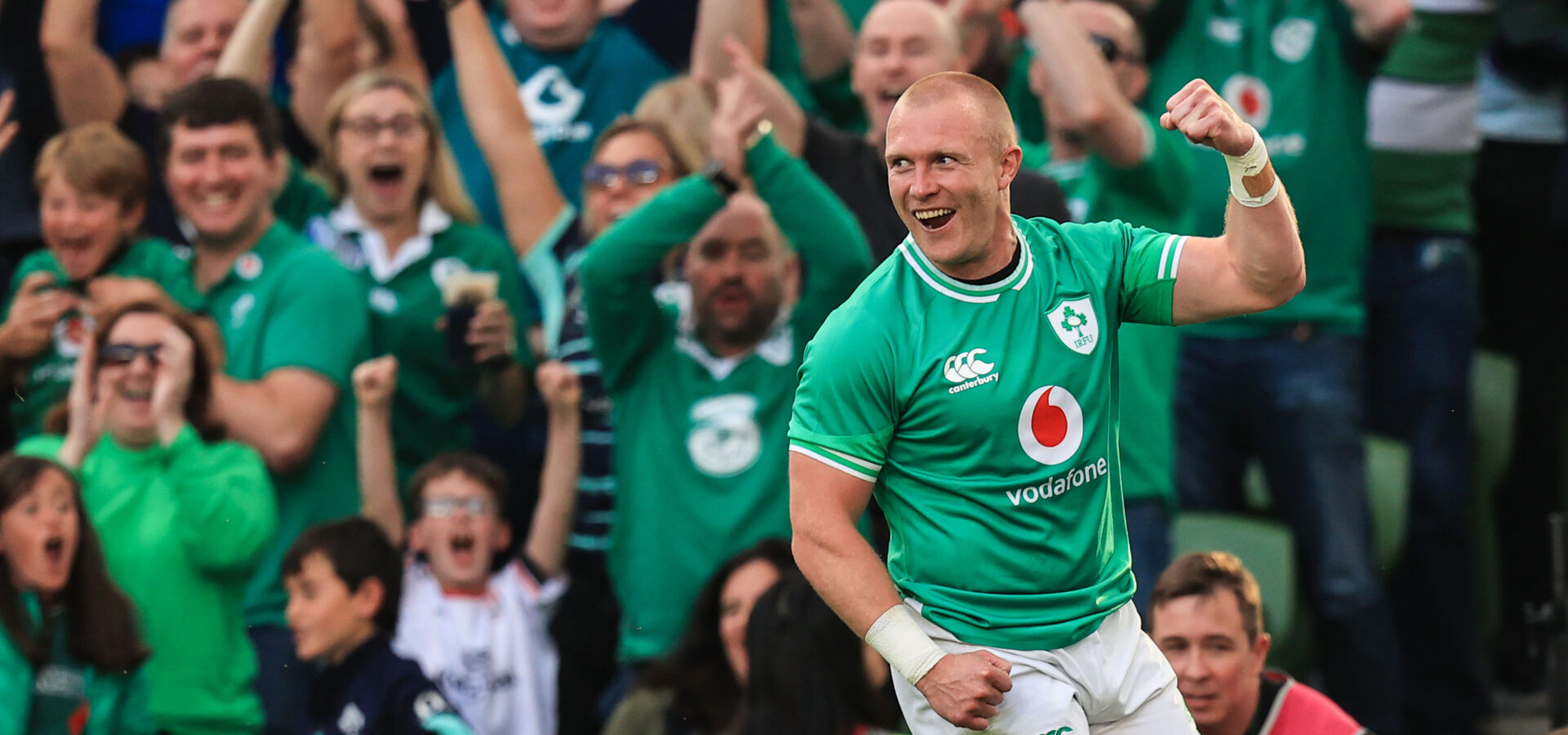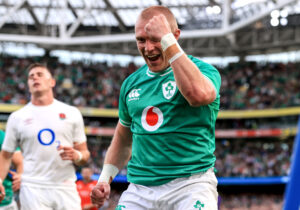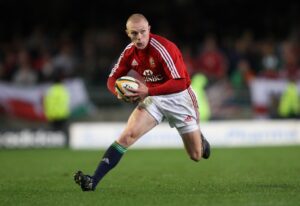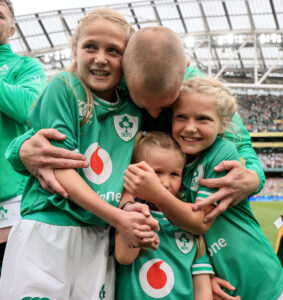News
A Transcending Influence

Perhaps the most likely explanation for Keith Earls’ popularity is contained in that familiar saying about the difficulty of keeping good men down.
To some, rugby might not be seen as a universal sport, but the Limerick man’s appeal transcends all divides. As he stole over for that iconic try on the occasion of his 100th Irish cap at the Aviva Stadium last summer, it certainly seemed like an entire nation applauded in unison. The result of the game was a mere footnote.

Mandatory Credit ©INPHO/Dan Sheridan
Next month Earls will be honoured at the 2024 Rugby Players Ireland Awards as he collects the Zurich Contribution to Irish Society Award. It will be an opportune time to reflect on his triumphs, challenges and the unwavering resilience that has seen him rise against the odds on several fronts.
Born in 1987, Earls grew up in the tight knit but sometimes turbulent neighbourhood of Moyross. Despite the prevalence of gangland feuds and its devastating effects, Earls remains immensely proud of his upbringing and acknowledges the role it played in shaping him into the man he is today. He wouldn’t swap it for anyone else’s.
Guided by better influences in the area, Earls sidestepped the pitfalls that surrounded him. His kicks were to be found on the sports fields. They say it takes a village to raise a child, but Earls’ neighbourhood did more than most and in so doing instilled an unfettered appreciation of community in the youngster.
Of course, his parents Sandra and Ger played their part too. Indeed, Ger was a rugby player of some repute and is often cited as one of the best players never to have been capped by his country. He remained of those brave stalwarts who underpinned the game without ever achieving fame or fortune.
Like his father before him then, Keith duly found purpose on a rugby field. Given its proximity, Thomond Park had always been in Earls’ sights but soon it came to represent opportunity and would serve to fortify him against the temptations lurking nearby. By 19 he was an established presence in a Munster squad destined for their second Heineken Cup. He was in Irish squads by 20. A British & Irish Lion by 21.

Mandatory Credit ©INPHO/Billy Stickland
To those with a keen eye for talent, Keith’s rapid rise to prominence may not have come as much of a surprise. However, few could have anticipated the impact and legacy Earls’ 16-year professional career would have on the wider community. For beyond Lions tours, European Cups and 101 Irish Rugby caps there lay another story.
As teams began to get to grips with Earls’ prodigious talent, it seemed the gods ceased to smile on him as they once had. He suffered a crisis in confidence leading to fierce battles with his own mind, exacerbated by the anxieties that came with living a young life on the edge.
For years, few realised that when cameras focused on Earls, his battle hardened gaze was not always because of the physical specimens running down his channel, but a reflection of the internal struggle he faced getting out there in the first place. It was only when we were first introduced to ‘Hank’ in Earls’ autobiography ‘Fight or Flight’ that people began to get a clearer understanding of the Limerick man.

Sean Curtin/True Media
Earls’ decision to share his bipolar diagnosis of 2013 was a watershed moment for the mental health conversation in Ireland. Instead of crossing the street to congratulate him on his performance at the weekend, people began to do so to thank him for his honesty. To this day his journey continues to inspire those facing similar challenges.
The personification of his destructive alter-ego also served as a catalyst for his on-field renaissance. For much of the early part of his career, Earls’ external naysayers remained to be convinced of his worth. Yet when Ireland won the Grand Slam in 2018, Earls was deservedly voted by his peers as their player of the year and any lingering sceptics were silenced.
Six months into retirement, Earls now sits assuredly in Irish Rugby folklore. He has found great solace in his achievements but more in the freedom from the rigors of professional rugby. He has left many of his anxieties back in the dressing room and now relishes the simple things with his wife Edel and their three young girls Ella-May, Laurie and Emie.
His commitment to family and the community remains unbowed. He is an ambassador for the Make-A-Wish Foundation and raised over €20,000 for Barnardos during the pandemic. He is also an ambassador for the McDonald’s Youth Opportunity Ireland programme, through whom he strives to empower young people from similar backgrounds to his own, offering guidance and support.

Mandatory Credit ©INPHO/Dan Sheridan
Despite his reserved demeanour, he has become a much-respected voice in Irish society, one of those rare individuals who commands the attention of even the giddiest room. His appeal to the public to exercise greater care upon the outbreak of Covid-19 resonated far more than any politician’s call for compliance.
Traditionally viewed through the lens of tribalism, rugby’s popularity has soared in recent years. While results have played their part, the personalities who have brought it about have been the real game changers. As he began to understand more about himself, the Irish public developed a greater affinity for the winger.
“I spent a lot of years not being myself because I was embarrassed,” he told Donald McRae. “I always thought other people were better than me and I’d try and be like them. But I’ve finally become comfortable with who I am. I understand what I stand for as a person and a rugby player.”
In a world often clouded by uncertainty, Keith Earls serves as a reminder that authenticity and integrity are root ingredients for greatness in a person. He is not just a rugby player; he transcends boundaries and has become a symbol of hope and inspiration to so many.
He will forever be remembered as one of the good guys.
Keith Earls will be presented with the Zurich Contribution to Irish Society Award on May 22nd at the Rugby Players Ireland Awards 2024 held at the Clayton Hotel, Burlington Road.
Back to NewsLatest Posts

Inaugural Past Players Padel Tournament

The Ireland Sports Fund

Making Tracks
















